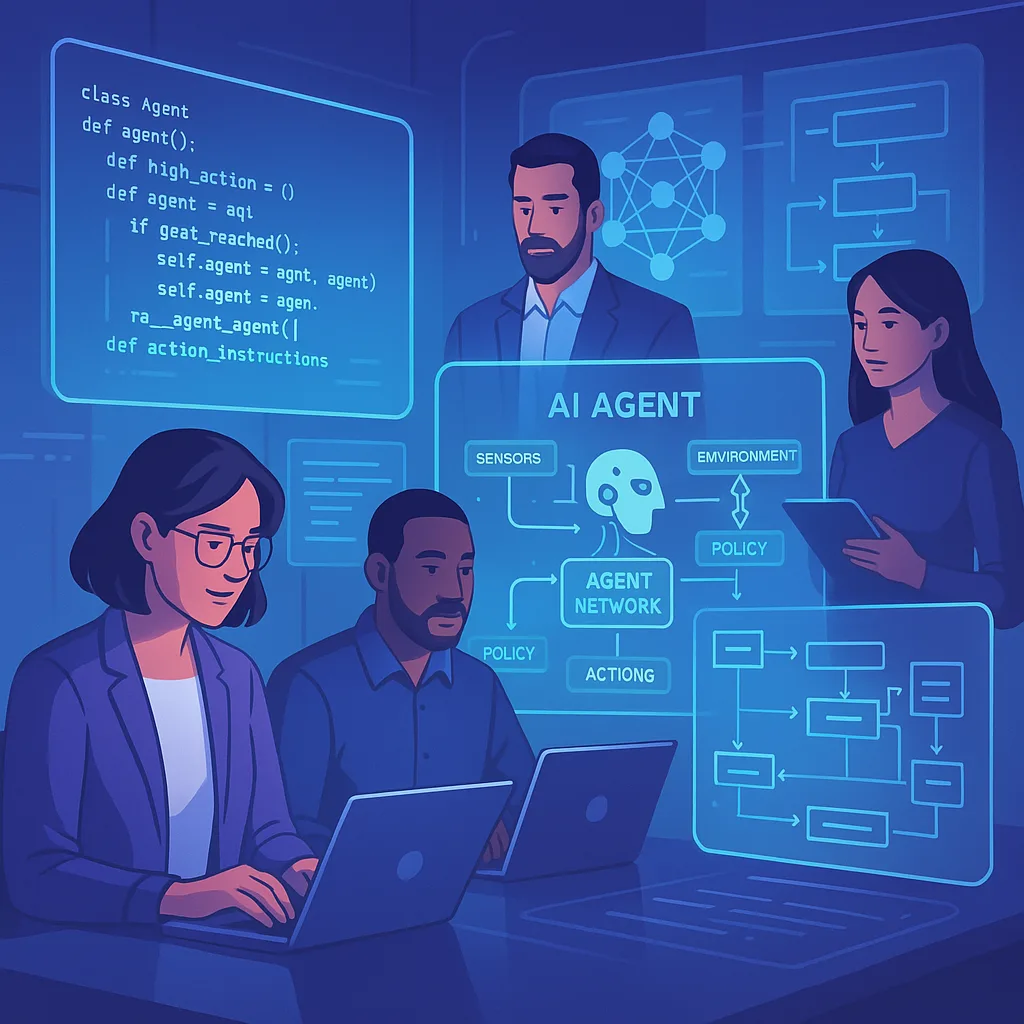Table of Contents
- Understanding the Current AI Agent Development Landscape
- Common Challenges Facing Beginner AI Agent Developers
- Technical Complexity and Framework Confusion
- The Reliability and Predictability Problem
- Skills Integration Challenge
- The Bias and Ethics Trap
- Essential Skills for AI Agent Development Success
- Core Programming Foundation
- Machine Learning and AI Fundamentals
- Cloud Computing and DevOps
- Framework-Specific Expertise
- Step-by-Step Tutorial: Building Your First AI Agent
- Phase 1: Environment Setup and Foundation (Week 1)
- Phase 2: Implementing Intelligence and Tools (Week 2)
- Phase 3: Advanced Features and Production Readiness (Week 3-4)
- Advanced Techniques and Best Practices
- Multi-Agent Coordination
- Performance Optimization and Scaling
- Security and Ethical Considerations
- Career Pathways and Specializations
- Specialization Options
- Building Your Professional Portfolio
- Future-Proofing Your AI Agent Development Career
- Emerging Trends to Watch
- Continuous Learning Strategy
- Mastering Your AI Agent Development Journey in 2025
- Source:
Margabagus.com – The AI agent development field is experiencing unprecedented growth, with AI engineers earning an average salary of $145,080 according to the US Bureau of Labor Statistics, and a projected job growth of 26 percent between 2023 and 2033. Yet here’s the striking reality: while the US expects 1.3 million AI job openings in two years, the talent supply will meet fewer than 645,000. This massive AI agent developer skills gap presents an extraordinary opportunity for those ready to master how to become AI agent developer in today’s rapidly evolving landscape.
Consider this: AI engineers are experiencing exceptional demand in 2025, with average salaries soaring to $206K, a huge $50K increase from the previous year. The revolution isn’t just about higher paychecks, it’s about building the autonomous systems that will define the next decade of technology. From customer service chatbots that never sleep to research agents that can analyze thousands of documents in minutes, AI agents are transforming how businesses operate and how humans interact with technology.
But here’s what most aspiring developers don’t realize: becoming proficient in AI agent development isn’t just about understanding machine learning algorithms or knowing Python syntax. It requires mastering an entirely new paradigm of programming where you’re not just writing code, you’re designing intelligent systems that can reason, plan, and act autonomously. Are you ready to join this transformation and position yourself at the forefront of the most lucrative tech career of 2025?
Understanding the Current AI Agent Development Landscape
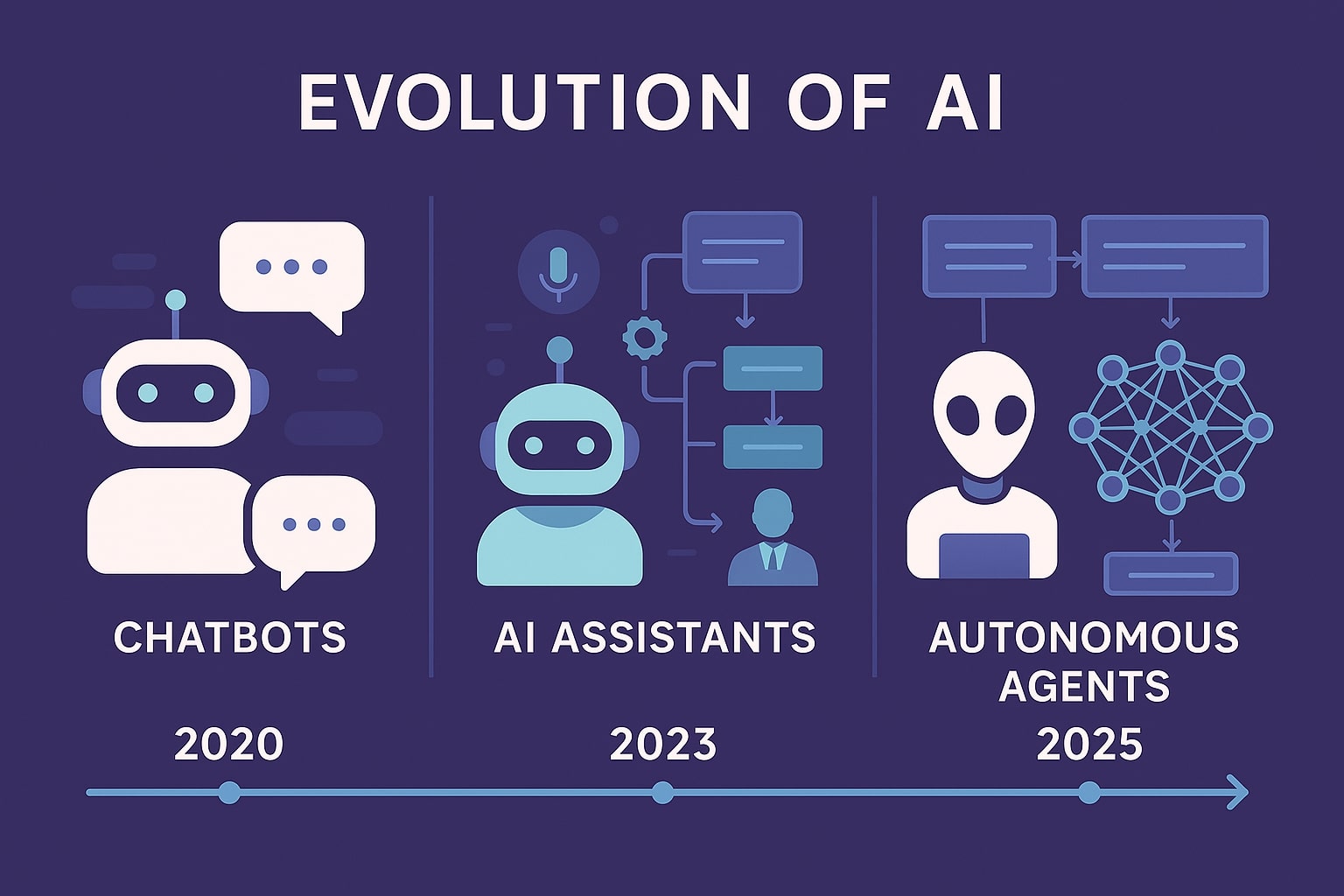
Image create with Microsoft Copilot.
The landscape of AI agent development has transformed dramatically since early 2024. Unlike traditional software that follows predetermined paths, AI agents are autonomous systems capable of perceiving their environment, making intelligent decisions, and taking actions to achieve specific goals without constant human oversight.
IBM and Morning Consult conducted a survey of 1,000 developers building AI applications for enterprise, and 99% of them said they are exploring or developing AI agents. This isn’t merely a trend, it’s a fundamental shift in how we approach software development.
What Makes 2025 Different for AI Agent Development?
The convergence of several technological advances has created perfect conditions for AI agents to flourish. Four key developments compared to models from 12 to 18 months ago enable today’s AI agents: enhanced planning capabilities, improved reasoning abilities, sophisticated tool usage, and operation at unprecedented speed and scale.
Modern AI agents operate on three core principles that distinguish them from conventional software:
Autonomy: They can operate independently, making decisions based on their understanding of the environment and objectives. Unlike chatbots that simply respond to queries, AI agents can initiate actions, set priorities, and adapt their strategies based on changing circumstances.
Reasoning and Planning: Advanced agents can break down complex tasks into manageable steps, anticipate potential obstacles, and develop contingency plans. This capability enables them to handle multi-step workflows that previously required human intervention.
Tool Integration: Modern agents can seamlessly integrate with external systems, APIs, databases, and software tools. This allows them to perform real-world tasks like sending emails, updating databases, or generating reports.
Check out this fascinating article: The Ultimate AI Agent Tools and Frameworks Comparison Guide for 2025: Which Solution Is Right for You?
Common Challenges Facing Beginner AI Agent Developers
Despite the tremendous opportunities, newcomers to AI agent development face several significant hurdles that can derail their progress if not properly addressed.
Technical Complexity and Framework Confusion
Choosing the right AI agent framework is often harder than building the agent itself. The marketplace is flooded with options—LangChain, CrewAI, AutoGen, LangGraph, OpenAI Swarm—each with distinct strengths and learning curves.
Many beginners make the mistake of jumping between frameworks without mastering the fundamentals. LangGraph has the steepest learning curve (3/10) but offers the most design freedom, while AutoGen is easiest (10/10) but provides less flexibility. This creates a paradox where the most accessible tools may limit long-term growth, while powerful frameworks require substantial upfront investment.
The Reliability and Predictability Problem
AI agents can make mistakes or encounter unexpected situations that break their execution flow. The same agent may produce different results for identical inputs due to the non-deterministic nature of LLMs. This unpredictability makes it challenging to deploy agents in production environments where consistency is crucial.
Beginners often underestimate this challenge, focusing on impressive demos rather than building robust, production-ready systems. The gap between a working prototype and a reliable business solution is significant and requires understanding error handling, fallback mechanisms, and testing strategies.
Skills Integration Challenge
AI agent development isn’t just about coding—it’s about integrating multiple complex skill sets. Building AI agents requires a mix of programming skills, machine learning understanding, data handling capabilities, cloud computing knowledge, and system design expertise.
Many developers excel in one area but struggle to connect the pieces. A strong Python programmer might understand the syntax but lack the machine learning intuition needed to design effective agent behaviors. Conversely, data scientists might understand ML concepts but struggle with software engineering best practices required for production deployment.
The Bias and Ethics Trap
AI models are often trained on large datasets scraped from the internet, which carry societal biases. If an AI Agent is used in hiring or law enforcement, it could unintentionally perpetuate gender or racial discrimination.
Beginners often overlook these ethical considerations, focusing solely on technical implementation. However, building responsible AI agents requires understanding bias detection, fairness metrics, and ethical AI principles from the beginning, not as an afterthought.
Essential Skills for AI Agent Development Success
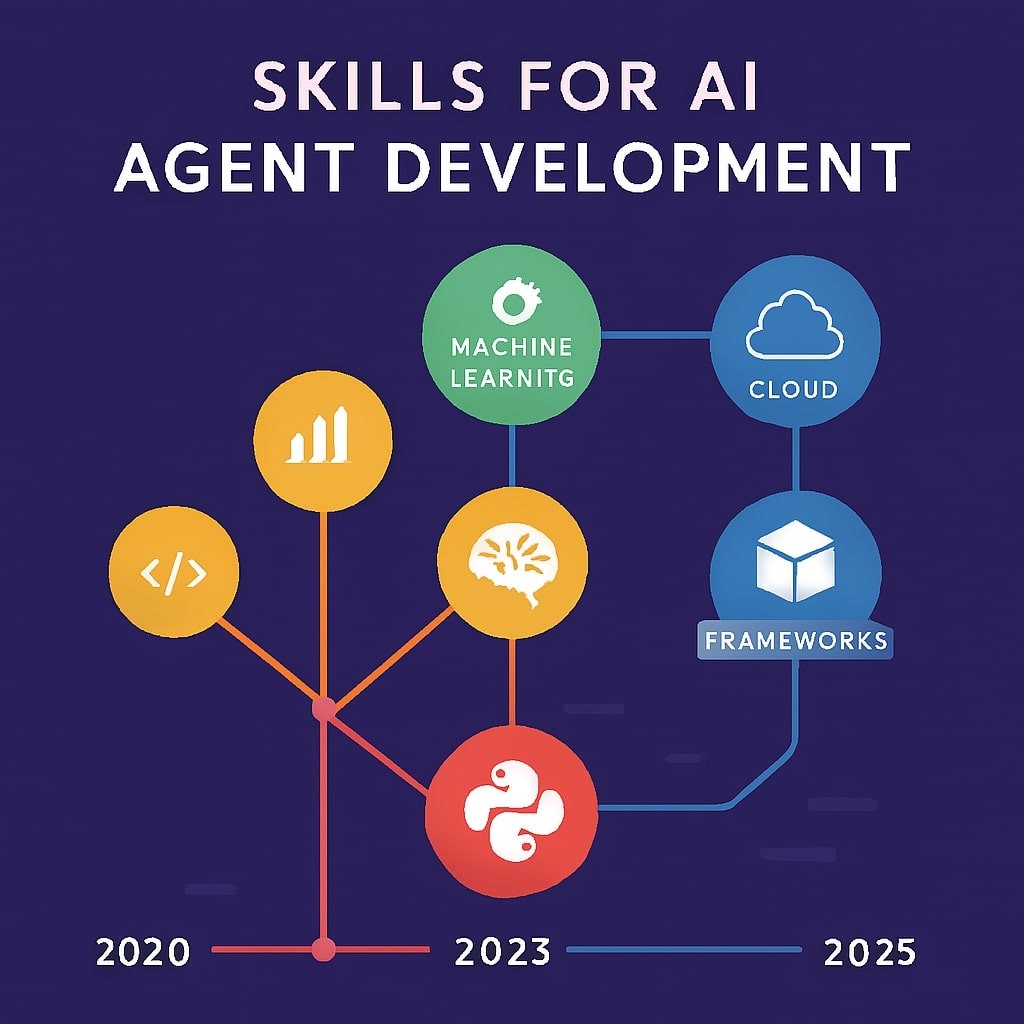
Image create with Microsoft Copilot.
Success in AI agent development requires mastering a carefully curated set of technical and conceptual skills. Based on current industry demands and expert recommendations, here’s your comprehensive skill development roadmap.
Core Programming Foundation
Python Mastery: Python is especially popular due to its easy-to-learn syntax and extensive libraries for AI and machine learning, with libraries such as TensorFlow, Keras, and PyTorch commonly used for AI development.
Your Python journey should focus on these critical areas:
Data Structures and Algorithms: Master lists, dictionaries, and sets for efficient data manipulation.
Object-Oriented Programming: Understand classes, inheritance, and encapsulation for building scalable agent architectures.
Asynchronous Programming: Learn async/await patterns essential for handling multiple agent tasks concurrently.
API Integration: Develop proficiency with requests, authentication, and webhook handling.
Essential Python Libraries for AI Agents:
LangChain/LangGraph: For building complex agent workflows and tool integration.
OpenAI SDK: For LLM integration and function calling.
Pandas/NumPy: For data manipulation and analysis.
FastAPI/Flask: For building agent APIs and web interfaces.
Machine Learning and AI Fundamentals
AI agents process data, recognize patterns, and make decisions through machine learning. Advanced techniques include CNNs for image recognition, RNNs for speech processing, and Transformers like ChatGPT.
Critical ML Concepts for Agent Developers:
Understanding Large Language Models (LLMs): Grasp how models like GPT-4, Claude, and Gemini process and generate text. Learn prompt engineering techniques, temperature settings, and token management.
Reinforcement Learning Basics: Reinforcement learning is where an agent learns by taking actions and receiving feedback in the form of rewards or penalties, aiming to maximize cumulative rewards through experience. This is crucial for building agents that improve over time.
Vector Databases and Embeddings: Understand how to store and retrieve information using semantic similarity, essential for building agents with long-term memory and knowledge retrieval capabilities.
Cloud Computing and DevOps
AI engineers should be familiar with cloud-based AI and machine learning services offered by major providers such as AWS, Azure, and Google Cloud Platform, which provide pre-built models, APIs, and tools for developing intelligent applications.
Essential Cloud Skills:
Container Orchestration: Learn Docker and Kubernetes for scalable agent deployment.
Serverless Computing: Master AWS Lambda, Azure Functions, or Google Cloud Functions for event-driven agents.
Database Management: Understand both SQL and NoSQL databases for agent data storage.
API Gateway Management: Learn to manage and monitor agent APIs at scale.
Framework-Specific Expertise
Based on comprehensive framework analysis, here’s how to approach the major AI agent frameworks:
LangGraph: Offers superior state management and graph-based workflows, ideal for complex, cyclical agent interactions and production environments, though with a steeper learning curve. Start here if you need maximum control and plan to build complex, production-grade systems.
CrewAI: Uses an intuitive “crew” metaphor, making agent communication natural with role-based orchestration and task management for parallel execution. Perfect for beginners who want to understand multi-agent coordination concepts.
AutoGen: Best for conversation-driven agents, supporting flexible agent topologies and parallel execution through agent networks. Ideal for building conversational AI systems and collaborative agent environments.
Step-by-Step Tutorial: Building Your First AI Agent
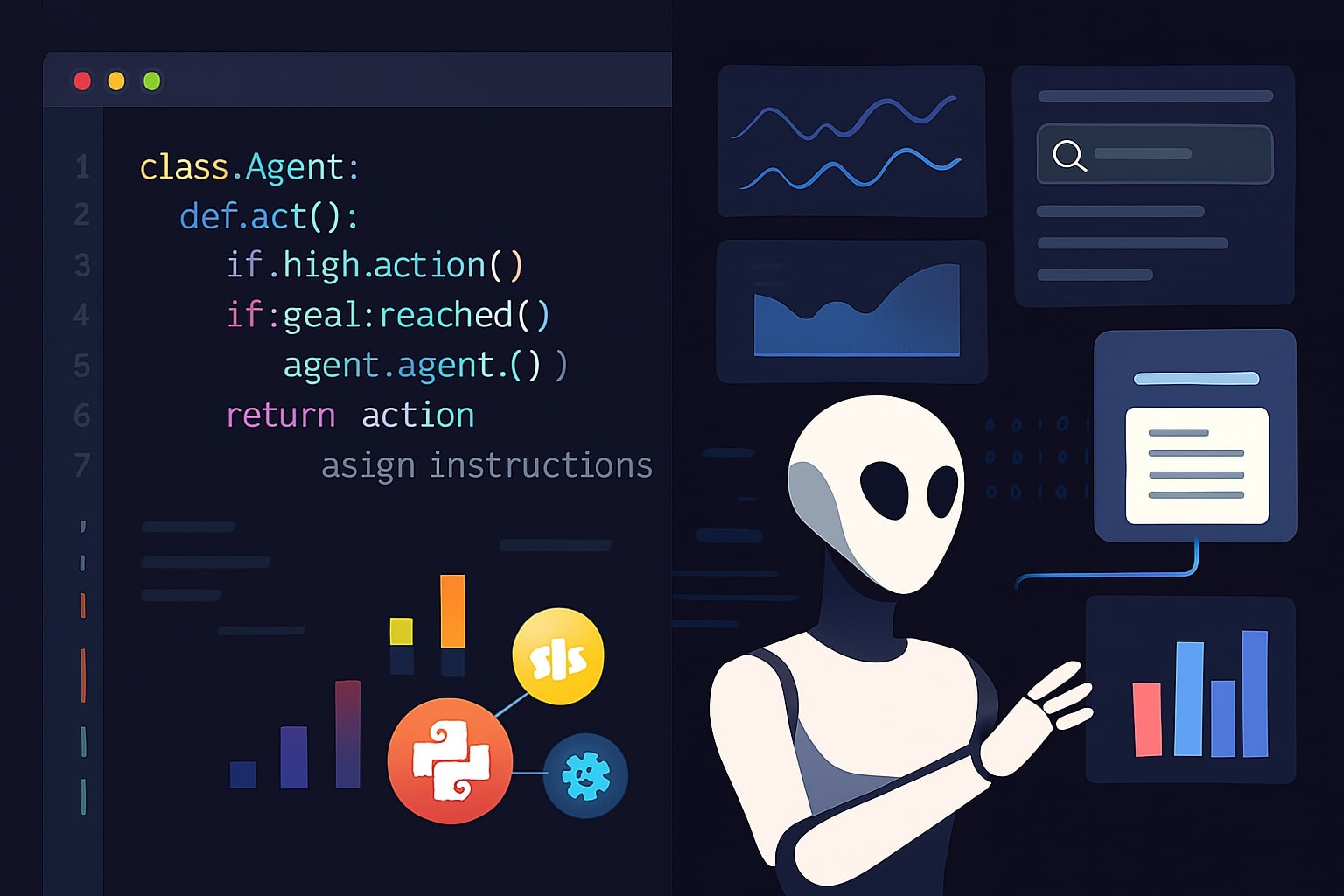
Image create with Microsoft Copilot.
Let’s build a practical AI agent that demonstrates core concepts while being immediately useful. We’ll create a “Research Assistant Agent” that can search the web, analyze information, and generate comprehensive reports.
Phase 1: Environment Setup and Foundation (Week 1)
Setting Up Your Development Environment
# Install essential packages
pip install langchain langchain-openai python-dotenv requests beautifulsoup4 pandas
# Create project structure
research_agent/
├── agents/
│ ├── __init__.py
│ ├── researcher.py
│ └── analyzer.py
├── tools/
│ ├── __init__.py
│ ├── web_search.py
│ └── content_analyzer.py
├── utils/
│ ├── __init__.py
│ └── helpers.py
├── config/
│ ├── __init__.py
│ └── settings.py
├── .env
└── main.py
Understanding Agent Architecture
Before writing code, understand the three core components:
- Perception: How your agent receives and processes input
- Decision-Making: How it chooses actions based on goals
- Action: How it executes tasks in the real world
Building the Foundation Classes
# agents/researcher.py
from typing import List, Dict, Any
from langchain.agents import initialize_agent, Tool
from langchain.llms import OpenAI
from tools.web_search import WebSearchTool
from tools.content_analyzer import ContentAnalyzer
class ResearchAgent:
def __init__(self, api_key: str):
self.llm = OpenAI(api_key=api_key, temperature=0.7)
self.tools = [
WebSearchTool(),
ContentAnalyzer(),
]
self.agent = initialize_agent(
self.tools,
self.llm,
agent="zero-shot-react-description",
verbose=True
)
def research_topic(self, topic: str, depth: str = "comprehensive") -> Dict[str, Any]:
"""Main research method that coordinates the entire process"""
prompt = f"""
Research the topic '{topic}' with {depth} depth.
Follow this process:
1. Search for current information about the topic
2. Analyze the credibility of sources
3. Identify key themes and insights
4. Generate a structured summary
Provide your findings in a clear, actionable format.
"""
result = self.agent.run(prompt)
return self._structure_results(result, topic)
Phase 2: Implementing Intelligence and Tools (Week 2)
Creating Specialized Tools
Your agent’s capabilities come from the tools it can use. Here’s how to build effective tools:
# tools/web_search.py
import requests
from bs4 import BeautifulSoup
from langchain.tools import Tool
from typing import List, Dict
class WebSearchTool:
def __init__(self):
self.name = "web_search"
self.description = "Searches the web for current information on any topic"
def search(self, query: str, num_results: int = 5) -> List[Dict[str, str]]:
"""Perform web search and return structured results"""
# Implementation using search APIs
# Note: Use proper search APIs like Serper, SerpAPI, or Google Custom Search
results = []
# Example structure - replace with actual API calls
search_results = self._call_search_api(query, num_results)
for result in search_results:
content = self._extract_content(result['url'])
results.append({
'title': result['title'],
'url': result['url'],
'snippet': result['snippet'],
'content': content[:2000], # Limit content length
'relevance_score': self._calculate_relevance(query, content)
})
return sorted(results, key=lambda x: x['relevance_score'], reverse=True)
def _extract_content(self, url: str) -> str:
"""Extract clean text content from web pages"""
try:
response = requests.get(url, timeout=10)
soup = BeautifulSoup(response.content, 'html.parser')
# Remove script and style elements
for script in soup(["script", "style"]):
script.extract()
text = soup.get_text()
lines = (line.strip() for line in text.splitlines())
chunks = (phrase.strip() for line in lines for phrase in line.split(" "))
text = ' '.join(chunk for chunk in chunks if chunk)
return text
except Exception as e:
return f"Error extracting content: {str(e)}"
Implementing Decision-Making Logic
# agents/decision_engine.py
class DecisionEngine:
def __init__(self):
self.priority_weights = {
'urgency': 0.4,
'accuracy': 0.3,
'relevance': 0.2,
'freshness': 0.1
}
def evaluate_sources(self, sources: List[Dict]) -> List[Dict]:
"""Evaluate and rank information sources"""
for source in sources:
source['credibility_score'] = self._calculate_credibility(source)
source['final_score'] = self._calculate_weighted_score(source)
return sorted(sources, key=lambda x: x['final_score'], reverse=True)
def should_search_more(self, current_results: List[Dict], confidence_threshold: float = 0.8) -> bool:
"""Determine if additional research is needed"""
if not current_results:
return True
avg_confidence = sum(r.get('confidence', 0) for r in current_results) / len(current_results)
coverage_score = self._calculate_coverage(current_results)
return avg_confidence < confidence_threshold or coverage_score < 0.7
Phase 3: Advanced Features and Production Readiness (Week 3-4)
Implementing Memory and State Management
# agents/memory.py
import json
from datetime import datetime
from typing import Dict, List, Optional
class AgentMemory:
def __init__(self, storage_path: str = "agent_memory.json"):
self.storage_path = storage_path
self.short_term_memory = {}
self.long_term_memory = self._load_long_term_memory()
def store_research_session(self, topic: str, results: Dict, metadata: Dict):
"""Store research results for future reference"""
session_data = {
'timestamp': datetime.now().isoformat(),
'topic': topic,
'results': results,
'metadata': metadata,
'quality_score': self._evaluate_session_quality(results)
}
self.long_term_memory[f"session_{len(self.long_term_memory)}"] = session_data
self._save_long_term_memory()
def find_related_research(self, topic: str, similarity_threshold: float = 0.7) -> List[Dict]:
"""Find previous research related to current topic"""
related_sessions = []
for session_id, session_data in self.long_term_memory.items():
similarity = self._calculate_topic_similarity(topic, session_data['topic'])
if similarity >= similarity_threshold:
related_sessions.append({
'session_id': session_id,
'similarity': similarity,
'data': session_data
})
return sorted(related_sessions, key=lambda x: x['similarity'], reverse=True)
Error Handling and Reliability
Building robust error recovery mechanisms remains a major challenge in AI agent development. Here’s how to address this:
# utils/error_handling.py
import logging
from functools import wraps
from typing import Callable, Any
class AgentErrorHandler:
def __init__(self):
self.logger = logging.getLogger(__name__)
self.retry_strategies = {
'api_error': {'max_retries': 3, 'backoff': 2},
'timeout': {'max_retries': 2, 'backoff': 5},
'rate_limit': {'max_retries': 5, 'backoff': 60}
}
def with_retry(self, error_type: str = 'api_error'):
"""Decorator for implementing retry logic"""
def decorator(func: Callable) -> Callable:
@wraps(func)
def wrapper(*args, **kwargs) -> Any:
strategy = self.retry_strategies[error_type]
for attempt in range(strategy['max_retries']):
try:
return func(*args, **kwargs)
except Exception as e:
self.logger.warning(f"Attempt {attempt + 1} failed: {str(e)}")
if attempt < strategy['max_retries'] - 1:
time.sleep(strategy['backoff'] * (2 ** attempt))
else:
self.logger.error(f"All retries failed for {func.__name__}")
raise e
return wrapper
return decorator
Production Deployment Considerations
# config/production.py
import os
from pydantic import BaseSettings
class ProductionConfig(BaseSettings):
# API Configuration
openai_api_key: str = os.getenv("OPENAI_API_KEY")
search_api_key: str = os.getenv("SEARCH_API_KEY")
# Performance Settings
max_concurrent_requests: int = 10
request_timeout: int = 30
cache_ttl: int = 3600
# Security Settings
rate_limit_per_minute: int = 60
max_content_length: int = 1000000
allowed_domains: List[str] = ["*"] # Configure based on needs
# Monitoring
log_level: str = "INFO"
metrics_enabled: bool = True
health_check_interval: int = 300
class Config:
env_file = ".env"
Advanced Techniques and Best Practices
Multi-Agent Coordination
CrewAI prioritizes simplicity with its role-based design, making it easy to set up AI collaborations without needing complex coordination logic. Here’s how to implement effective multi-agent systems:
# agents/multi_agent_system.py
from typing import List, Dict, Any
from enum import Enum
class AgentRole(Enum):
RESEARCHER = "researcher"
ANALYZER = "analyzer"
WRITER = "writer"
REVIEWER = "reviewer"
class MultiAgentOrchestrator:
def __init__(self):
self.agents = {}
self.workflow_state = {}
self.communication_log = []
def coordinate_research_project(self, project_spec: Dict[str, Any]) -> Dict[str, Any]:
"""Coordinate multiple agents to complete a research project"""
# Phase 1: Information Gathering
research_results = self.agents[AgentRole.RESEARCHER].gather_information(
project_spec['topic'],
project_spec['requirements']
)
# Phase 2: Analysis
analysis = self.agents[AgentRole.ANALYZER].analyze_findings(
research_results,
project_spec['analysis_criteria']
)
# Phase 3: Content Creation
draft = self.agents[AgentRole.WRITER].create_content(
analysis,
project_spec['output_format']
)
# Phase 4: Quality Review
final_output = self.agents[AgentRole.REVIEWER].review_and_refine(
draft,
project_spec['quality_standards']
)
return {
'project_id': project_spec['id'],
'final_output': final_output,
'process_metadata': self._generate_process_metadata(),
'quality_metrics': self._calculate_quality_metrics(final_output)
}
Performance Optimization and Scaling
AI agents should be able to grow with your business, ensuring performance remains optimal even as demand increases through cloud-based solutions that can dynamically scale.
Implementing Efficient Caching
# utils/caching.py
import redis
import json
import hashlib
from typing import Any, Optional
class AgentCache:
def __init__(self, redis_url: str = "redis://localhost:6379"):
self.redis_client = redis.from_url(redis_url)
self.default_ttl = 3600 # 1 hour
def cache_llm_response(self, prompt: str, response: str, ttl: Optional[int] = None):
"""Cache LLM responses to reduce API calls"""
cache_key = f"llm_response:{self._hash_prompt(prompt)}"
self.redis_client.setex(
cache_key,
ttl or self.default_ttl,
json.dumps(response)
)
def get_cached_response(self, prompt: str) -> Optional[str]:
"""Retrieve cached LLM response"""
cache_key = f"llm_response:{self._hash_prompt(prompt)}"
cached = self.redis_client.get(cache_key)
return json.loads(cached) if cached else None
def _hash_prompt(self, prompt: str) -> str:
"""Create consistent hash for prompt caching"""
return hashlib.sha256(prompt.encode()).hexdigest()[:16]
Security and Ethical Considerations
Implementing Bias Detection
# utils/bias_detection.py
from typing import Dict, List
import re
class BiasDetector:
def __init__(self):
self.bias_indicators = {
'gender': ['he/she assumptions', 'gendered pronouns', 'role stereotypes'],
'racial': ['racial descriptors', 'cultural assumptions'],
'age': ['age-related assumptions', 'generational stereotypes'],
'socioeconomic': ['class assumptions', 'economic stereotypes']
}
def analyze_content_bias(self, content: str) -> Dict[str, float]:
"""Analyze content for potential biases"""
bias_scores = {}
for bias_type, indicators in self.bias_indicators.items():
score = self._calculate_bias_score(content, indicators)
bias_scores[bias_type] = score
return bias_scores
def generate_bias_report(self, content: str) -> Dict[str, Any]:
"""Generate comprehensive bias analysis report"""
bias_scores = self.analyze_content_bias(content)
return {
'overall_bias_score': sum(bias_scores.values()) / len(bias_scores),
'individual_scores': bias_scores,
'recommendations': self._generate_bias_recommendations(bias_scores),
'flagged_phrases': self._identify_problematic_phrases(content)
}
Career Pathways and Specializations
The AI agent development field offers multiple specialization paths, each with unique opportunities and requirements.
Specialization Options
Enterprise AI Agent Developer: Focus on building agents for large organizations. AI engineers at tech firms typically see salaries in the $100k–$150k range in the US, often plus stock options or RSUs that can greatly increase total compensation.
Required skills: Enterprise integration, security compliance, scalability design, and business process understanding.
Research-Oriented Agent Developer: RL specialists who build algorithms for decision-making agents are relatively fewer but highly sought in cutting-edge research, with some RL research scientists at top labs earning $200k+.
Required skills: Deep reinforcement learning, academic research methodology, and advanced mathematics.
Product-Focused Agent Developer: Build consumer-facing AI agents for applications, games, and services.
Required skills: User experience design, product development, rapid prototyping, and market analysis.
Building Your Professional Portfolio
Essential Portfolio Projects:
- Multi-Modal Research Agent: Demonstrate ability to work with text, images, and structured data
- Real-Time Decision Agent: Show competency in time-sensitive applications
- Collaborative Agent System: Prove understanding of multi-agent coordination
- Production-Ready Agent: Display deployment and monitoring capabilities
Open Source Contributions: Contributing to frameworks like LangChain, CrewAI, or AutoGen demonstrates deep understanding and builds industry connections.
Check out this fascinating article: AI Agents 2.0: Building Autonomous Teams That Work While You Sleep
Future-Proofing Your AI Agent Development Career
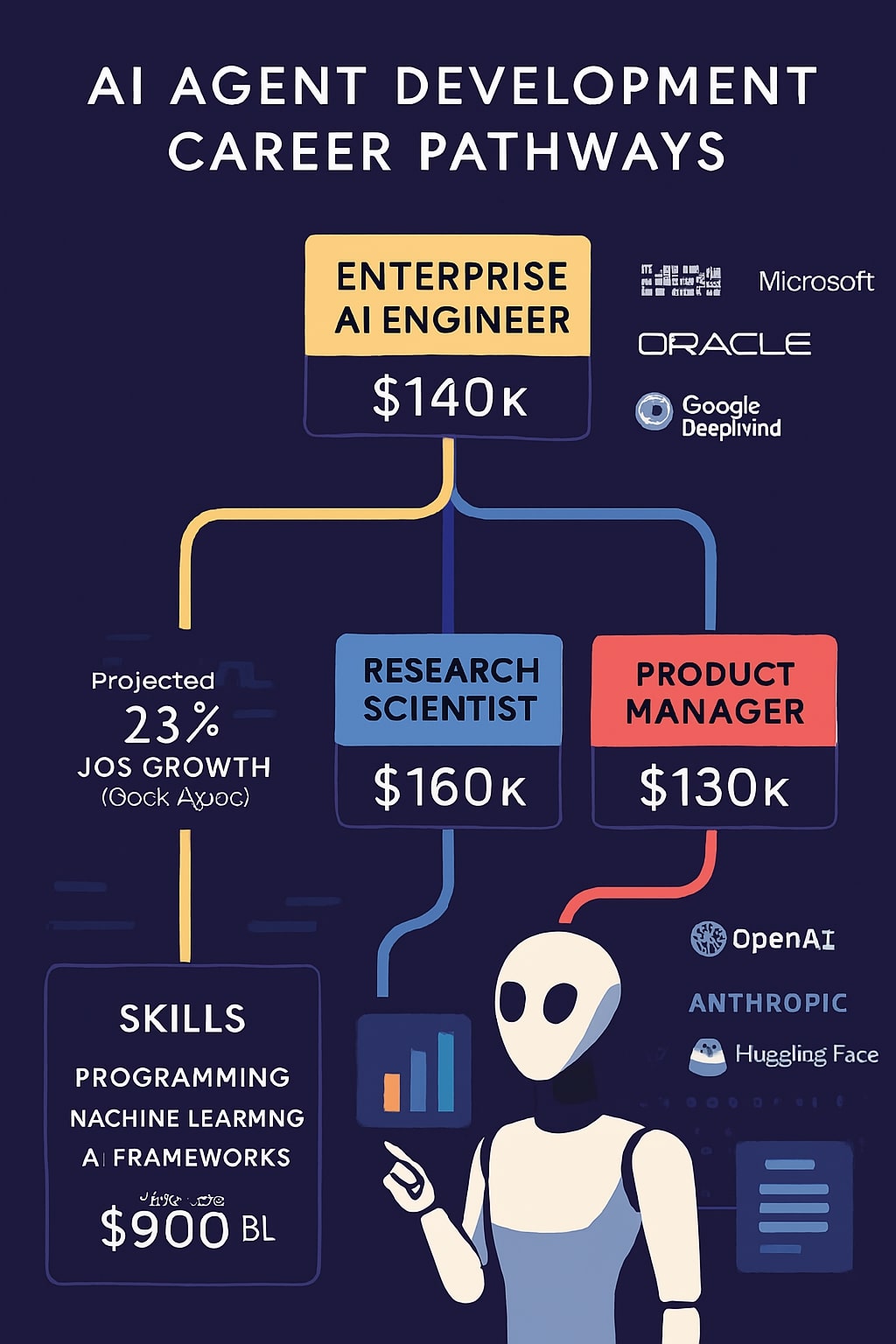
Image create with Microsoft Copilot.
Emerging Trends to Watch
Agentic RAG Systems: Compared to traditional RAG systems, agentic RAG allows large language models to conduct information retrieval from multiple sources and handle more complex workflows.
Edge AI Agents: As compute power increases on edge devices, agents will move closer to data sources for reduced latency and improved privacy.
Regulatory Compliance: AI agent governance refers to the processes, standards and guardrails that help ensure agentic systems are safe and ethical. Understanding compliance will become increasingly valuable.
Continuous Learning Strategy
Stay Updated with Framework Evolution: The AI agent ecosystem evolves rapidly. LangGraph is newer than AutoGen and CrewAI, and the framework is constantly getting updated.
Engage with the Community: Join AI agent development communities, attend conferences, and participate in hackathons. 2025 is the year of AI agents, with events like Microsoft’s AI Agents Hackathon providing opportunities to learn from expert-led sessions and build powerful agents.
Develop Cross-Functional Skills: AI agent development often involves multidisciplinary teams. Clear communication ensures smooth collaboration, from brainstorming ideas to implementing solutions.
Check out this fascinating article: Top 10 Trends Driving AI Agent Adoption in Modern Companies
Mastering Your AI Agent Development Journey in 2025
The journey to becoming a proficient AI agent developer represents more than just learning new technical skills, it’s about positioning yourself at the forefront of a technological revolution that will define the next decade. With AI engineers experiencing exceptional demand and average salaries soaring to $206K in 2025, the financial rewards are substantial, but the true opportunity lies in building systems that will fundamentally change how humans interact with technology.
The path we’ve outlined, from mastering Python and machine learning fundamentals to building production-ready multi-agent systems, provides a comprehensive foundation for success. Remember that real AI Engineers build agents, not just prompts, requiring a structured approach and the mindset of an AI engineer rather than a prompt hacker. The key is to start with solid fundamentals, build practical projects, and gradually increase complexity as your understanding deepens.
As you embark on this journey, keep in mind that the AI agent landscape is still rapidly evolving. While 99% of enterprise developers are exploring AI agents, we’re still in the early stages of truly autonomous systems. This presents an unprecedented opportunity for those who start learning now to become experts in a field that’s just beginning to reach its potential.
The future belongs to developers who can design, build, and deploy intelligent systems that can reason, plan, and act autonomously. With the roadmap provided in this guide, the essential skills outlined, and the practical tutorials to get you started, you have everything needed to transform from a curious beginner into a skilled AI agent developer. The question isn’t whether AI agents will reshape our technological landscape, it’s whether you’ll be among those leading that transformation.
Source:
- Bureau of Labor Statistics – AI Engineer Employment Projections 2023-2033
- Analytics Vidhya – Generative AI Salary Trends 2025 Edition
- Coursera – AI Engineer Salary Report 2025
- 365 Data Science – AI Engineer Job Outlook 2025
- IBM Research – AI Agents Survey 2025
- Glassdoor – AI Engineer Salary Data 2025
- McKinsey & Company – AI Job Market Analysis 2024-2025
- DataCamp – Essential AI Engineer Skills Study 2024
- Roadmap.sh – AI Agents Learning Path 2025
- LangChain Documentation – Multi-Agent Framework Comparison
